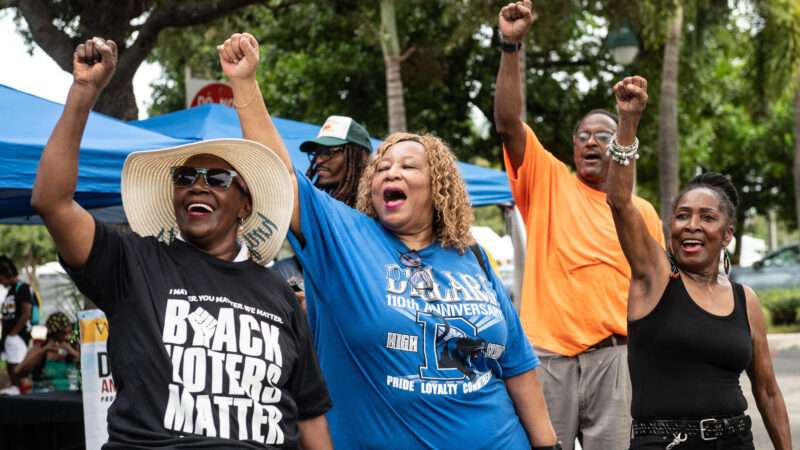
On January 11, the Center for Election Confidence released a study of the effects of ranked choice voting (RCV). (The center, previously known as the Lawyers Democracy Fund, opposes RCV.)
The study—conducted by Nolan McCarty, a public affairs professor at Princeton University—found that RCV "disproportionately decreases the representation and electoral influence of minority voters." But a study out today from FairVote, a nonpartisan group that advocates for the adoption of RCV, reached a very different conclusion.
On an RCV ballot, instead of picking a single candidate, voters rank multiple candidates in order of preference. When votes are tallied, if one candidate gets over 50 percent of the vote, then that person wins; if not, then the candidate who got the least votes is eliminated, and all their voters' ballots are retallied with the second choices counted. This process repeats until one candidate reaches a majority.
In the study released last week, McCarty wrote that "minority electorates may be negatively impacted by the adoption of ranked-choice voting," as it "may dilute minority voter influence to the extent to which those voters exhaust their ballots by failing to rank the majority-group candidates."
If a voter only picks one candidate instead of ranking them all, and the race goes to a second round of counting, the voter's ballot is "exhausted" because there are no more candidates to count.
McCarty notes that in the 2021 New York City Democratic primary elections, voting districts with higher concentrations of certain minority groups saw higher rates of ballot exhaustion than districts that were majority-white. Notably, he also found lower rates of ballot exhaustion in majority-black districts, specifically among the races for mayor and public advocate, in which two black candidates—Eric Adams and Jumaane Williams, respectively—were ultimately victorious.
McCarty also studied the 2022 midterm elections in Alaska but found the data more difficult to parse. Nevertheless, he similarly found higher levels of ballot exhaustion among Alaska Native voters, with the exception of the state's U.S. House race, in which an Alaska Native—Democratic candidate Mary Peltola—was ultimately successful.
"The patterns of ballot exhaustion suggest that minority-group voters are not taking full advantage [of] the system," McCarty concludes, though he does not know "whether those higher rates of exhaustion are due to ballot complexity, lower levels of information and mobilization, or racial and ethnic polarization."
But while McCarty purports that RCV "weakens" minority voters' "electoral influence," what he actually found was that minority voters do turn out for candidates within their own ethnic group. Not only does this phenomenon exist, but it has been well documented—"affinity voting" occurs along not only ethnic but also gender lines.
A study out today from FairVote reached a different conclusion.
Using "data from 448 RCV elections" from around the country, FairVote's Deb Otis and Sabrina Laverty found that nonwhite voters "demonstrate the tendency to rank more candidates than White voters." In RCV races that went to second- or third-round tallies, nonwhite candidates increased their vote share at greater rates than white candidates.
In the 2021 primary, "New York [City] elected Eric Adams as its second Black mayor, and picked the most diverse city council in its history," the report notes, and "for the first time, women won a majority of council seats." The same year, "Salt Lake City used RCV to choose its city council members for the first time. People of color won a majority of seats, and most members identify as LGBTQ+."
Notably, McCarty concluded that minority voters exhaust their ballots at higher rates when there is not a candidate of their same ethnic group. But ballot exhaustion does not necessarily mean a voter didn't vote their conscience. "We simply cannot assume that not using every RCV choice amounts somehow to being deprived of influence," says Walter Olson, senior fellow at the Cato Institute's Robert A. Levy Center for Constitutional Studies. He characterizes the choice not to rank all candidates as "the functional equivalent of not choosing to vote in a runoff when no candidate you found acceptable made it to the final round."
Will Mantell, FairVote's communications director, agrees: "RCV actually makes more ballots count compared to single-choice elections or runoffs. It's really hard to say that RCV doesn't make more votes count in New York City, for example, when the last citywide primary runoff in 2013 had a 62 percent turnout dropoff from the primary to the runoff."
The post Does Ranked Choice Voting Disenfranchise Minorities? appeared first on Reason.com.







